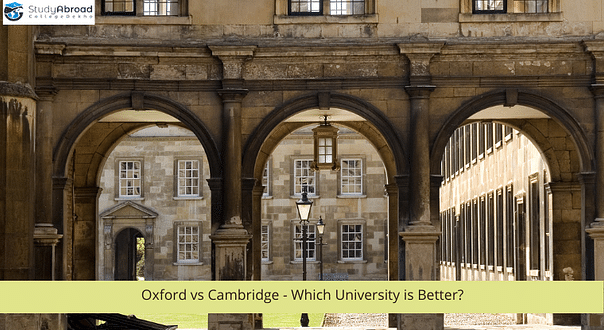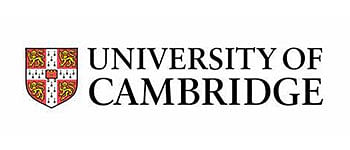The UK has been the abode of world-famous universities that have been catering to the education of students for centuries. Oxford and Cambridge have been existing for a long time and are known for their architecture and rivers gliding across the cities. They appear to be arch-rivals when it comes to education.
Education at both universities revolves around the collegiate system and both practice tutorial teaching. For a student who has grown up reading and hearing about the glorious Oxford and Cambridge, it is a tough choice to make between the two. However, a comparative analysis is bound to bring out the differences that persist in the ranking, course, curriculum, and other parameters.
Also, a student is forbidden from choosing both universities for application by the UK’s Universities and Colleges Admissions Service (UCAS). So, in order to help you decide ahead of time, here is all about Oxford vs Cambridge.
Highlights of Oxford vs Cambridge
Let us compare both universities quickly to have an understanding of the various parameters on the basis of which we can distinguish them:
|
Key Components |
Oxford |
Cambridge |
|---|---|---|
|
Year Founded |
1096 |
1209 |
| Location | Oxford, England | Cambridge, England |
|
Acceptance Rate |
17% |
15% |
|
Programs of Study |
UG Programs -19 PG Programs -32 |
UG Programs -27 PG Programs -97 |
|
Rankings of Subjects on QS World Rankings |
Ranked best for 44 subjects |
Ranked best for 45 subjects |
|
Tuition Fees |
£26,770 to £37,510 |
£22,227 to £33,827 |
|
Total Number of Students (2021) |
22,155 |
19,660 |
|
Student-Teacher Ratio |
3:1 |
4:1 |
| Score Range |
IELTS Band 7 out of 9 or TOEFL score must be 100 or PTE score is 66. Minimum 90% marks in the 5 optional subjects with 95% in the two chosen subjects. (For bachelor's admission) GPA 3.3 out of 4, GRE/GMAT scores are accepted. (For masters) |
IELTS Band 7.5, TOEFL score of 110 with minimum 25 in each section. Applicants must get 90% or above in board examinations. (For bachelors admission) GMAT score of 640-730 is required or equivalent GRE scores,70% marks in graduation(For masters admission) |
|
Number Of Colleges |
39 |
31 |
| Graduation Rate | 89% | 92% |
| Facilities | Library, Virtual Learning Environment, Accommodation and catering, University sports, clubs, and societies. | Library, Computing and IT, Language Centre, Museum and collections, Facilities to worship, celebrate and meditate |
| Top Recruiters | Bank of America Merrill Lynch, Deloitte, Cisco, Goldman Sachs International, HSBC, Huawei | Amazon, McKinsey & Company, Google, Uber, and The Boston Consulting Group. |
| Median Salary | GBP 35,700 | GBP 92,000 |
The detailed differences between Cambridge and Oxford have been discussed in detail below so that they can make the best choices to suit their needs.
Find Out the Best Colleges to Study in the UK!
Rankings of Oxford vs Cambridge
Yes, Oxford and Cambridge are close competitors but both of them are nonpareil in terms of rankings. Let us have a keener glance at the rankings of both institutes:
|
Rankings |
Oxford |
Cambridge |
|---|---|---|
|
QS Ranking 2022 |
2 |
3 |
|
Times Higher Education 2022 |
1 |
5 |
|
The Guardian |
1 |
3 |
|
World Economic Forum |
1 |
6 |
Best Courses to Study at Oxford vs Cambridge
The courses are a crucial part of the selection of a university. You should choose the course about which you are passionate. If a student wishes to study science, on day 1 at Oxford, students are inducted into the subject, allowing them to explore its complexities and beauties of it. On the other hand, at Cambridge, a student has to study Natural Sciences and later in the 3rd year, they can choose their specialisation. The other popular courses are listed below:
|
Top Courses at Oxford |
Top Courses at Cambridge |
|---|---|
|
Art and Design |
Anthropology |
|
Philosophy |
Statistics |
|
History |
Geology |
|
Linguistics |
Chemical Engineering |
|
Medicine |
English |
Average Tuition Fees at Oxford vs Cambridge
The fees of both universities differ according to courses. However, we have made an attempt to provide you with an overview of the cost of education that you will have to incur. Check with the university websites for a fee breakup and details for each course.
|
Annual Tuition Fees |
Oxford (in GBP) |
Cambridge (in GBP) |
|---|---|---|
|
Undergraduate |
26,770-37,510 |
22,227-33,827 |
|
Postgraduate |
12,223-29,160 |
22,482-36,012 |
You can check out the video that highlights the differences between Oxford University and Cambridge University which helps you make informed choices regarding the same.

International Scholarships at Oxford vs Cambridge
Both Oxford and Cambridge offer a number of scholarships to international students. Here is a list of scholarships offered by both along with their overall values:
Oxford Scholarships and Fundings
International students are eligible for scholarships to study at Oxford University. The grants that are provided are sufficient to cover the cost of living and education. The names of a few scholarships are:
-
Palgrave Brown Scholarship: It covers the living cost.
-
Reach Oxford Scholarship: This scholarship covers the course fee, living cost, and one return airfare per year.
-
Simon and June Li Undergraduate Scholarship: The funding covers course fees and living costs.
-
D.H. Chen Foundation Scholarships: These cover course fees and living expenses.
-
Chevening Scholarships: These include tuition fees, accommodation, and travel.
-
Rhodes Scholarship: These scholarships include tuition, travel expense, health insurance, and accommodation.
Cambridge Scholarships and Fundings
The international students studying at Cambridge have to incur a huge cost. But to aid education there are several scholarships that cover various expenses.
-
Cambridge Trust Scholarship: It makes some contribution towards tuition fees.
-
Manmohan Singh Scholarship: It is specifically for Indian students enrolling in the Cambridge BA programme.
-
Rowan Williams Cambridge Studentship: This includes tuition fees and an annual stipend.
-
Khazanah Cambridge Scholarship: This covers tuition fees, one return economy airfare, and an annual stipend.
Salary Offered at Oxford vs Cambridge
Graduating from prestigious universities like Oxford and Cambridge increases possibilities for developed career prospects and recruiters usually consider such graduates a great value addition to their organisations.
The data collected from 320 graduates of Oxford in 2017-18 shows that the average annual salary was GBP 41,600, with a median salary of GBP 35,700. Almost 80% of the graduates were employed and 89% of the graduates were meaningfully employed in the job of their choice.
Bank of America Merrill Lynch, Deloitte, Cisco, Goldman Sachs International, HSBC, Huawei, and many more international companies have tied up with Oxford for placements.
On the other hand, 92% of students who graduated from Cambridge received job offers within three months of graduation and 89% of them were employed in 26 different countries. The average salary offered to them is about GBP 92,000, with a base salary package is GBP 67,000. The top companies that recruit Cambridge graduates include Amazon, McKinsey & Company, Google, Uber, and The Boston Consulting Group.
The survey by Emolument shows that the average salary packages of graduates in 2021-22 are:
|
Course |
Oxford Graduate Average Salary in USD |
Cambridge Graduate Average Salary Package in USD |
|---|---|---|
|
MA |
133,000 |
125,000 |
|
MBA |
130,000 |
131,000 |
|
LLM |
127,000 |
118,000 |
Student Life at Oxford vs Cambridge
Oxford functions with an aim to make students have an individual experience and be excited about their future prospects. No two individuals can have the same life experiences according to them. They wish to instil confidence and self-belief. The Oxford community provides a feeling of belongingness to each student and no one is left out of the socialisation process. There are a great number of groups, clubs, and activities going around the year that help students bring out the best of themselves. There are around 400 clubs to choose from and participate in, allowing students to find exposure and reveal their personalities.
Similarly, Cambridge also offers an incredible experience to its students. There are around 500 clubs where students can participate and relate with like-minded fellows. The university is filled with cinemas, theatres, and entertainment that you can relish well. Dramas, music in form of choirs and ensembles, and functions take place throughout the year. The university focuses on inculcating a healthy lifestyle and promotes recreational and competitive sports for all students. There are around 80 sports to choose from at Cambridge, which include iceball, judo, kickboxing, etc.
Oxford vs Cambridge: Verdict
The differences between Oxford and Cambridge are nominal and if there are any, this article is evidence of that. Both are at their height of excellence. The instructions, tuition fees, and living costs differ minimally.
The only visible difference is in the course structure of both universities. Oxford packs various fields into a degree, whereas, Cambridge emphasises singular disciplines as degrees. Nevertheless, both universities can offer learning and research at the highest levels of global education. And, choosing between the two is only a privilege.
Are you still confused between Oxford and Cambridge? Let our experts guide you. Write to them at abroad@collegedekho.com.
Looking for the Right Course at Oxford or Cambridge?

























